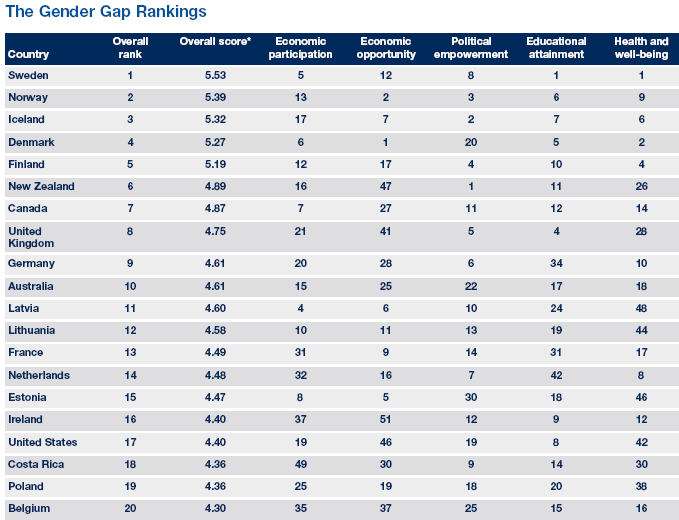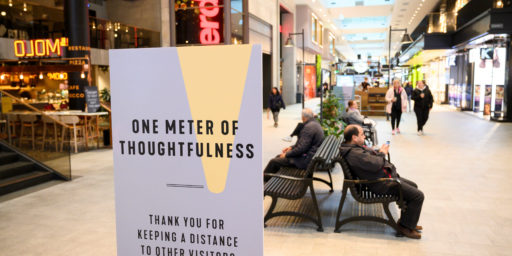World Equality Rankings
Sweden is the country with the most equality and Egypt the least, according to a recent survey by World Economic Forum of 58 major countries.
Sweden “world’s most equal country” (The Local)
Sweden is the most equal country in the world, according to a new report. Swedish women are in a better position on the labour market than their counterparts in most other countries, and have better access to healthcare and education. Yet Feminist Initiative founder Gudrun Schyman argues that women in Sweden still suffer from domestic violence and labour market discrimination.
The study, by the World Economic Forum (WEF), examined the “gender gap†in 58 countries including 30 industrialised countries and 28 developing countries. Sweden, Norway, Iceland, Denmark and Finland held the top five position in the rankings, as the countries with the smallest gender gap.
Sweden achieved top spot for the educational attainment and health and well-being categories, fifth place for economic participation, eighth place for political empowerment and twelfth for economic opportunity.
The WEF said that equality in the Nordic region was helped by “strongly liberal societies, with an impressive record of openness and transparency in government, and comprehensive safety nets that provide security to vulnerable groups in the population.â€
UK in top ten for closing gender gap, reveals study (The Scotsman)
THE UK ranks among the top ten countries for closing the gender gap between men and women, a study shows today. It comes eighth in the table of 58 nations compiled by the World Economic Forum measuring patterns of inequality. Sweden, Norway, Iceland, Denmark and Finland top the chart, which takes into account key factors such as education and economic status. The study says they are characterised by “strongly liberal societies” with impressive records of “openness and transparency” in government. “While no country has yet managed to eliminate the gender gap, the Nordic countries have succeeded best in narrowing it and, in a very clear sense, provide a workable model for the rest of the world,” the study says.
The study measures economic participation (whether there is equal pay for equal work), economic opportunity (access to labour not restricted to low-paid, unskilled jobs) and political empowerment. It also takes into account educational attainment and health and well-being.
The UK has strong scores in the areas of political empowerment, where it comes fifth, and educational attainment, where it is fourth. Augusto Lopez-Claros, chief economist at the WEF, said: “Our aim is to allow countries to identify their strengths and weaknesses in an area of critical importance for the development process.”
‘Gender gap’ is biggest in Egypt (BBC)
Women in Egypt are the furthest behind men in terms of economic equality, while no country has closed the “gender gap” entirely, a new survey has found. Sweden has the smallest difference between the sexes, followed by Norway, Iceland, Denmark and Finland, according to the World Economic Forum (WEF).
The report singled out the US for particular criticism, saying it “lags behind many Western European nations”. It was a “disturbing fact” that women still trailed men, the WEF said.
Swiss equality is less equal than others (Swiss Info)
Switzerland ranks far behind its Western European neighbours when it comes to sexual equality, a study by the World Economic Forum (WEF) has revealed. In the new “Gender Gap Index”, Switzerland comes an unimpressive 34th. The gap between men and women is narrowest in Scandinavia.
Entitled Women’s Empowerment: Measuring the Global Gender Gap, the report measures the gap between women and men in five areas. Switzerland does well on health and well-being (7) and relatively well on political empowerment (17) — which the WEF says is a notable achievement for a country in which women could neither vote nor stand for national election until 1971. But it lags behind not only in economic participation and economic opportunity, but also in educational attainment, being one of the very few developed nations where female enrolment rates are consistently lower than those for men. In 34th place, Switzerland comes below below Russia, Uruguay and China. Of Switzerland’s neighbours, only women in Italy get a rawer deal.
The top 20:

The full report is available in PDF format: Women̢۪s Empowerment: Measuring the Global Gender Gap
I haven’t read the full report and am unlikely to get around to doing so. Still, I’m highly dubious of results that have the United States ranked 46th(!) in economic opportuniy and 42nd in health and well being for women. Let’s look at the definitions, to see if that clears anything up.
Economic opportunity concerns the quality of women’s economic involvement, beyond their mere presence as workers. This is a particularly serious problem in developed countries, where women may gain employment with relative ease, but where their employment is either concentrated in poorly paid or unskilled job “ghettos,†characterized by the absence of upward mobility and opportunity. This is most commonly the result of negative or obstructive attitudes, and of legal and social systems which use maternity laws and benefits to penalize women economically for childbirth and child care responsibilities, and discourage—or actively prevent—men from sharing family responsibilities.
This is an odd definition of the term. So, women could be doing quite well economically and have no legal barriers to entry yet be considered somehow oppressed if they have chosen low income professions or to sacrifice career success in order to raise a family?
Health and well-being is a concept related to the substantial differences between women and men in their access to sufficient nutrition, healthcare and reproductive facilities, and to issues of fundamental safety and integrity of person. According to the World Health Organization, 585,000 women die every year, over 1,600 every day, from causes related to pregnancy and childbirth. The Planned Parenthood Federation of America quotes estimates that of the annual 46 million abortions worldwide, some 20 million are performed unsafely, resulting in the deaths of 80,000 women from complications, accounting for at least 13% of global maternal mortality, and causing a wide range of longterm health problems.
Hmm. So, Planned Parenthood claims as to the safety of abortions are factored in to the health status of American women?!
To paraphrase Andre the Giant, I do not think those words mean what you think they mean.


![Military Coup Underway In Egypt [Update: Morsi Deposed]](https://otb.cachefly.net/wp-content/uploads/2011/02/egypt-flag3-512x256.gif)



Perhaps as expected, the rankings seem to assume that only the government provides well-being for women. Also, given the greatly varying needs and expectations of women (at least in the Western world, where women have much broader opportunities to choose the patterns of their lives), it’s difficult to believe the few numerical criteria selected fully capture the experience of women in health, economics, etc.
Considering that the Swiss didn’t give women the vote until 1976, I’d say they’ve come a long way, baby.
I think many people simply don’t realize how far we still have to go in this country. Shutting out info from studies that don’t hold with your world view doesn’t help. In many social indicators, we rank low compared to others and are more similar to what we would call “poor countries”. Please note the sentence about “liberal societies”. It’s very true. It also happens that the countries that ranked lower tend to be more conservative societies.
Equality based on lowering the standards for everybody isn’t necessarily a great thing. I bet most US working women consider that they’d be better off in Estonia or Latvia every day.
This study had nothing to do with if women are better off, it is a study of equality. The United States ranks low in economic opportunity cause a great number of women who work in the US work in jobs like waitressing or chamber maids and do not have the same opportunity as men do in terms of the type of work that is available to them. As the definition suggests it goes beyond their mere presence as workers.
I find it amusing that so far it is men who are defending this report.
My opinion? It is a biased report that does not cover or use as measures accurate issues that women face in their lives.
I’ve worked in a non-traditional environment my entire adult life and worked all through my teens for the ability and opportunity to do so. I’ve faced many of the so-called barriers and suceeded. Not because some government body or social watchdog said I must be given something…But by being the best at what I do.
Progress in a woman’s life shouldn’t be graded on how much society allows her or how much the government gives her or how much affirmative action is awarded.
A good society is one that allows that type of freedom. The right to suceed or fail on your own merits.
Progress in a woman’s life should be graded on how much she has achieved by her own talents and will power in whatever role she decides to embrace.
(chuckle)
Leave it to men to believe women are not equal. We women know we are equal and then some.
Jack, I wouldn’t bet the farm if I were you….
I find it funny that so far it is mainly men defending this obviously biased report. This is not a report concerning how equal or how free women are to pursue their individual intersts. It’s a report on how liberal a government is in giving women what they “think” is important.
I’ve bucked the system my entire life pushing the borders to be allowed in classes in school that were designated male only. (Back in the stone age when I was just a wee bear cub) I’ve also spent my entire adult life in a non-traditional proffession.
A woman’s life cannot be judged by what she is given, but by what she has earned by her own talent and will power.
If you want to judge a country concerning women. Judge it not by what it GIVES a woman, but by what RIGHTS she has to pursue what she feels important. Just because we can all be president doesn’t mean we all want to be president.
To paraphrase Andre the Giant, I do not think those words mean what you think they mean.
Actually, I think you are paraphrasing Mandy Patinkin (Inigo Montoya), rather than Andre (Fezzik).
Having lived in both Canada and the US, I’m a little wary of ANY report that ranks Canada’s healthcare system nearly 30 points higher.